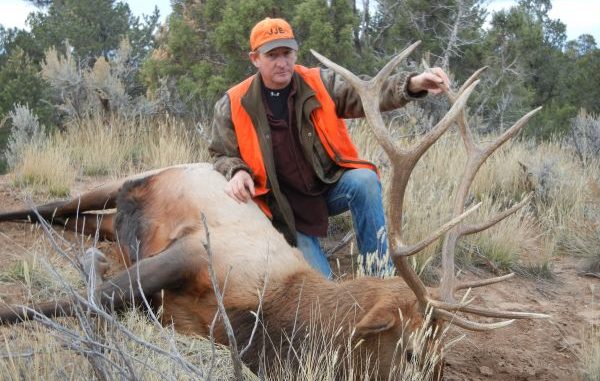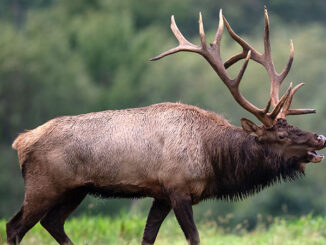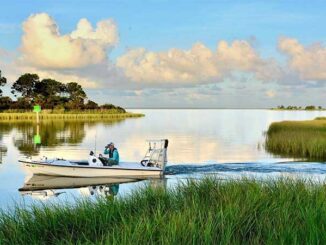
Now is the time to plan that elk hunt
Like a lot of other hunters, my first experiences out west were do-it-yourself (DIY) hunts on public land.
My hunting partners and I would load up all the camping gear and make the long drive, eagerly anticipating our western adventure. We stood in line with a lot of other non-resident hunters and purchased over-the-counter licenses before heading off to public land for mule deer, elk or pronghorn.
Most of the time we were going to some place we heard about from someone who knew someone that heard it was a pretty good spot. Considering our lack of experience in hunting those species and knowing even less about where we were going, some of those hunts turned out fairly well.
At other times, we arrived to find our secret spot already overcrowded, devoid of game or terrain that was so difficult we were not equipped to deal with it. Even on those occasions we sometimes managed limited success, either through very hard work or sheer luck.
Being lucky was easier, but that seldom happened.
As time went on, we gained some experience and found better places to go and better ways to improve our odds. Admittedly, being a wildlife enforcement officer and making the acquaintance of other officers in western states worked to our advantage. Many of the western guys were willing to point us in the right direction, and we sometimes swapped duck hunts and fishing trips for help on western hunts.
One of my best friends to this day is Rick Pallister, a retired Wyoming game warden. Rick and I have swapped hunts and fishing trips, and he has taken me places and shown me things in Wyoming I would never have seen otherwise. Hunts with him were quality experiences with great memories.
So when my first cousin’s son, an avid young hunter, told me he was going to Colorado for the archery elk season last fall, I had to ask a few questions. I learned he was hunting public land.
He did not know the area but was acquainted with someone who had hunted there several times, and it was supposed to be good early season elk country.
It sounded like he had about as much information as I had on some of my early hunts out west, and I wished him luck.
Upon his return, we talked about his experience. Unfortunately he had not been successful.
They had lost a couple of days of hunting due to rain making the roads into his hunt area impassable. When he did finally get into the “backcountry,” elk were scarce. But people weren’t.
He described one evening hunt on a pretty park with some elk sign, including a wallow. It was quiet and things were looking good as the sun set.
Just about prime time, when elk might come out to feed, another hunter came stomping out of the timber and walked across the park, ruining any chances of seeing elk.
Worst of all, when a herd of elk finally did move into the area on the last day of the hunt, they were run out of the country by a couple of people on ATVs who suddenly showed up and tried to push the herd onto neighboring private property.
It was pretty much a disaster, and I felt sympathy for my young relative. I gave him the same advice I would give anyone else.
Next time get an outfitter.
Though we don’t think in terms of outfitters or guides when hunting in our home state on familiar ground, in some situations it’s certainly worth considering.
Duck hunting requires a big investment in boats, motors, decoys, blinds and leasing private land. An outfitter is the economical way to go for someone who just wants to make a duck hunt or two each season without the investment in gear and land.
I always recommend a professional outfitter/guide to any non-resident inquiring about waterfowl hunting in Louisiana. Even though we have plenty of top-quality waterfowl hunting on public land in the Sportsman’s Paradise, learning the area and getting together the right equipment for a successful hunt can be daunting.
In addition, I don’t know of any public land hotspots the local guys don’t already have sewn up. And since guiding or outfitting for hire is prohibited on all wildlife management areas, the service is restricted to private land.
For reasons not altogether clear, fishing guides in Louisiana must be licensed by LDWF but no license is required for hunting guides and outfitters. Maybe it is because hunt guiding or outfitting is restricted to private property.
Such is not the case in many other states, particularly out west where a licensed outfitter might have exclusive rights to large tracts of public land. While holding a license does not necessarily mean he or she is a top-notch outfitter, I certainly would not consider one who is unlicensed.
So how do we go about selecting a good outfitter?
Reputation is the No. 1 consideration. If you know of someone who used an outfitter and had an enjoyable and successful hunt, talk to that person and ask about the outfitter and whether he would use his services again. Even if the hunter was not necessarily successful but still had a great time and enjoyed the hunt, that outfitter is likely a good choice.
Talk with the outfitter and get to know him. Find out if this is the kind of person you want to spend a week with day and night.
Ask for names and contact information on other clients. Avoid any outfitter reluctant to pass along such information.
Discuss meals and accommodations so you don’t show up expecting three hot meals and a warm cot but end up eating out of cold cans and sleeping on a rock.
Have a clear understanding about hunt expectations. If you will be hunting on public land, will he offer some level of assurance he can get you away from the crowds? Also, let the outfitter know up front if you are looking for meat, a decent representative trophy or a Boone and Crockett bull.
Rick and I were talking with a Wyoming outfitter a few years ago. He had just got back to town with a couple of clients, and things had not gone well.
He had put them on nice mule deer bucks early in the hunt. The hunters declined despite his warning they were not likely to find anything better in the area they were licensed to hunt.
They didn’t take the deer, and toward the end of the hunt wanted to go back and collect those bucks. The outfitter refused, telling them if those deer were not good enough the first day they were not good enough now.
I also recommend finding an outfitter with access to private land. The fees might be higher, but as far as I am concerned the money is well spent. Public land hunts don’t always offer the quality experience we want on an eagerly anticipated out-of- state hunt.
This past fall, I made what has become my annual Colorado elk hunt with outfitter Roy Hutt of Norwood Colorado. It was my fourth hunt with Roy, and I took a nice 6×6 bull, the best to date. I have had 75-percent success with Roy, taking three bulls in four hunts.
These are private-land hunts, and though we hunted a different area this year than the three previous years, it was still top quality. Roy’s staff this year were his wife Sally and son Tanner, and they took good care of us.
Remember there is absolutely nothing wrong with a well-planned DIY hunt, and plenty of people — including myself — have taken good elk, deer and pronghorn on public land on our own.
I also well remember the days when DIY hunts were all we could afford. Those hunts were great, and the feeling of accomplishment derived from earning a trophy on your own is very satisfying.
But a good outfitter can eliminate a lot of guesswork and uncertainty, and he knows more about what to do if things don’t go as planned.
An outfitted and guided hunt is well worth the costs, even if you have to save up for a few years to swing it. Just make sure to use good judgment and common sense, and find out everything you can before booking the hunt.
Right now is the time to start talking to outfitters and getting license applications ready for next fall.
Good luck on the hill.

